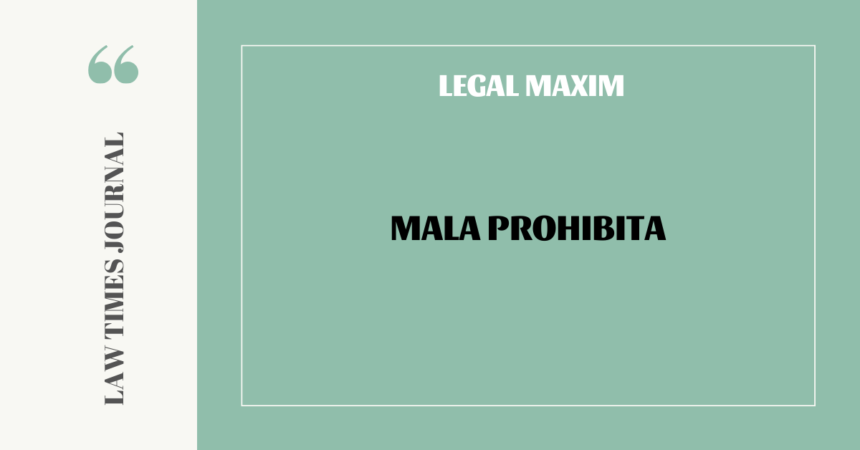Have you ever pondered the intricacies of law, and what truly makes something “wrong”? The concept of mala prohibita, or “wrong because prohibited,” often gets tangled with what most perceive as inherently immoral acts. However, understanding this distinction is crucial for navigating the complex legal landscape of America and engaging in meaningful discussions about justice and regulation. Therefore, let’s delve into what mala prohibita truly means.
Understanding Mala Prohibita: Wrong Because Prohibited
Mala prohibita refers to acts that are illegal not because they are inherently evil or immoral, but simply because they are prohibited by law. In other words, the wrongfulness stems from the fact that a rule or statute exists that forbids the behavior. In contrast, mala in se refers to acts that are inherently wrong or evil, such as murder, theft, or rape. The distinction between these two categories is fundamental to understanding the rationale behind many laws.
Defining Characteristics of Mala Prohibita Offenses
Firstly, offenses considered mala prohibita often involve activities that are not universally considered morally reprehensible. Secondly, they are typically regulatory in nature. Common examples include traffic violations, parking tickets, fishing without a license, building code violations, and certain business regulations. Consequently, these laws are often created to maintain order, protect public safety, or promote economic efficiency.
Examples in Everyday Life
To illustrate this concept, consider the simple act of jaywalking. While darting across a street outside of a designated crosswalk might be risky, it is not inherently evil. The reason it is illegal is to ensure pedestrian safety and maintain traffic flow. Similarly, failing to update your address on your driver’s license is not morally wrong, but it is against the law because it hinders communication from government agencies and could create complications if you were involved in an accident. Moreover, certain zoning laws could also be considered mala prohibita as there is no moral component of determining where businesses or homes can be built.
The Rationale Behind Mala Prohibita Laws
The justification for mala prohibita laws rests on the idea that even seemingly harmless activities can have negative consequences if left unregulated. These laws serve several important functions:
Promoting Public Safety
Many mala prohibita laws are designed to protect public safety. For example, regulations requiring motorcycle riders to wear helmets are not based on a moral judgment about personal freedom, but rather on the need to reduce head injuries and save lives. Similarly, laws prohibiting the sale of alcohol to minors are intended to protect young people from the harms associated with underage drinking.
Maintaining Order and Efficiency
Other mala prohibita laws aim to maintain order and efficiency in society. Traffic laws, such as speed limits and stop signs, are essential for preventing accidents and ensuring the smooth flow of traffic. Zoning regulations help to prevent conflicts between different types of land use, such as residential and industrial areas.
Protecting Economic Interests
Some mala prohibita laws are designed to protect economic interests. For example, regulations requiring businesses to obtain licenses and permits help to ensure that they are operating legally and fairly. Tax laws are essential for funding government services and infrastructure.
Criticisms and Controversies Surrounding Mala Prohibita
While mala prohibita laws serve important functions, they are not without their critics. Some argue that these laws can be overly burdensome, intrusive, or even discriminatory.
Overcriminalization and Excessive Punishment
One common criticism is that mala prohibita laws contribute to overcriminalization. The sheer number of these laws can make it difficult for people to avoid unintentionally breaking the law. Moreover, the penalties for violating these laws can sometimes seem disproportionate to the offense.
A user on Reddit commented, “It feels like there are laws for EVERYTHING these days. I’m not saying we shouldn’t have rules, but sometimes it feels like they’re just trying to catch us out.” This sentiment reflects a broader concern about the proliferation of regulations and the potential for innocent individuals to be caught in the legal net.
Selective Enforcement and Discrimination
Another concern is that mala prohibita laws can be selectively enforced, leading to discrimination. For example, studies have shown that traffic stops are more likely to target racial minorities, even though they are not necessarily more likely to be violating traffic laws. Similarly, enforcement of drug laws has been criticized for disproportionately affecting marginalized communities.
The Moral Ambiguity of Regulatory Offenses
One of the key challenges of mala prohibita laws is that they often involve activities that are morally ambiguous. It can be difficult to convince people that something is wrong simply because the law says it is. This can lead to a lack of respect for the law and a sense of resentment toward government authority.
Mala Prohibita vs. Mala in Se: Key Differences
Understanding the distinction between mala prohibita and mala in se is crucial for informed discussions about law, justice, and morality.
Inherent Wrongfulness
The most significant difference between mala prohibita and mala in se lies in their inherent wrongfulness. Mala in se offenses are considered wrong in and of themselves, regardless of whether there is a law prohibiting them. Mala prohibita offenses, on the other hand, are only wrong because the law says they are.
Moral Consensus
There is generally a broad moral consensus about mala in se offenses. Most people agree that murder, theft, and rape are wrong, regardless of their cultural or religious background. In contrast, there is often less consensus about mala prohibita offenses. People may disagree about whether certain activities should be regulated, and to what extent.
Severity of Punishment
The punishment for mala in se offenses is typically more severe than the punishment for mala prohibita offenses. This reflects the fact that mala in se offenses are considered more morally reprehensible and pose a greater threat to society.
The Impact of Mala Prohibita Laws on American Society
Mala prohibita laws have a profound impact on American society, shaping our behavior, influencing our economy, and affecting our criminal justice system.
Shaping Behavior and Social Norms
These laws play a significant role in shaping our behavior and establishing social norms. By regulating activities that are not inherently wrong, they encourage us to act in ways that are considered safe, orderly, and responsible. Over time, these regulations can become ingrained in our culture and influence our perceptions of right and wrong.
Influencing the Economy and Business Practices
Mala prohibita laws also have a significant impact on the economy and business practices. Regulations related to environmental protection, consumer safety, and labor standards help to ensure that businesses operate in a responsible and sustainable manner. These regulations can also create a level playing field for businesses, preventing unfair competition and promoting economic stability.
Affecting the Criminal Justice System
The large number of mala prohibita laws contributes to the high volume of cases processed by the American criminal justice system. Minor offenses, such as traffic violations and drug possession, account for a significant portion of arrests and convictions. This can strain the resources of the criminal justice system and lead to overcrowding in prisons and jails. It is also important to note that while the mala prohibita offenses aren’t seen as inherently evil, can cause negative effect to society when the laws are not enforced.
Expert Opinion on Mala Prohibita
“The distinction between mala in se and mala prohibita is crucial for understanding the foundations of our legal system. While mala in se reflects universal moral principles, mala prohibita demonstrates the evolving societal values and regulatory needs that shape our laws.” – Dr. Emily Carter, Professor of Criminal Justice.
Conclusion: Balancing Regulation and Freedom
Mala prohibita laws are an essential part of the American legal system. They serve important functions in promoting public safety, maintaining order, and protecting economic interests. However, they are not without their critics. It is important to carefully consider the potential benefits and drawbacks of these laws, and to ensure that they are fairly and effectively enforced. Balancing the need for regulation with the desire for individual freedom is a constant challenge, but it is one that is essential for creating a just and equitable society. The laws should be examined periodically to reflect what society finds acceptable.






